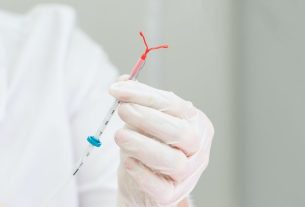Male infertility is a man’s inability to produce enough and/or viable sperm to fertilize the egg and result in pregnancy. A man’s reproductive capacity can often be influenced by lifestyle habits such as smoking, frequently drinking alcohol, being overweight or using illicit drugs, for example, reducing the production and quality of sperm.
In addition to being related to lifestyle habits, male infertility can also be due to changes in the reproductive system, infections, hormonal or genetic changes, or be a consequence of varicocele, which is a type of varicose vein that appears in the testicles and that directly interferes with sperm production.
It is important that the cause of infertility is identified so that the urologist can recommend the most appropriate treatment, which may include changes in habits, the use of medication, hormones or surgery.

Main causes of male infertility
The main causes of male infertility are:
1. Life habits
Some habits and lifestyle can reduce a man’s reproductive capacity, such as smoking, drinking and being overweight, for example, because it can lead to metabolic and hormonal changes, which can reduce the ability to produce sperm. Additionally, men who are frequently under stress may also have hormonal dysregulation, which can interfere with reproductive capacity.
The use of injectable drugs, such as anabolics to gain muscle mass, for example, can also lead to infertility, as they can shrink the testicles and, consequently, reduce sperm production.
What to do: In these situations, it is important to identify which factor may be related to infertility. In the case of smoking and alcoholic beverages, it is recommended to stop using them, while in the case of obesity, it is recommended to change eating habits and practice physical activity, for example.
If infertility is related to the use of injectable drugs, it is important that the drug is stopped being used and the treatment is recommended by the doctor, especially if there is any other associated change.
2. Varicocele
Varicocele is the most common cause of infertility in men and corresponds to the dilation of the testicular veins, which promotes blood accumulation and an increase in local temperature, directly interfering with sperm production. This situation most commonly occurs in the left testicle, but it can also happen only in the right or affect both testicles at the same time. Learn more about varicocele
What to do: When the doctor finds dilation in the veins indicative of varicocele, the recommendation is that surgery be performed to solve the problem. The surgery is simple and the man is discharged on the same day or the day after the procedure, and can resume normal activities after about 1 week.
3. Infections in the reproductive system
Some infections in the male reproductive system can affect the testicles and result in changes in the semen production process and the quality of the sperm produced, being more common as a result of infection with the virus responsible for Mumps.
In addition to infertility as a result of Mumps, urinary infections that have not been identified or treated correctly can also affect the testicle and compromise sperm production.
What to do: It is important that the cause of the infection is identified so that the most appropriate medication is indicated to treat the infection, which may be antifungal, antiviral or antibiotic. It is important that the partner of the man with the infection also undergoes treatment, even if he does not present symptoms, to prevent the infection from recurring.
4. Ejaculation problems
Some situations related to ejaculation, such as retrograde ejaculation or absence of ejaculation, can also be the cause of infertility, since the man is unable to release semen at the time of orgasm or produces little or no semen.
What to do: In these cases, treatment must be indicated by a urologist and consists of the use of medications that promote the release of semen, such as ephedrine or phenylpropanolamine. However, when drug treatment does not work, sperm collection and artificial insemination may be necessary. Understand how changes in ejaculation are treated.
5. Hormonal changes
Hormonal changes, especially with regard to the amount of circulating testosterone, can also cause infertility. In addition, high prolactin production, changes in the thyroid, use of anabolic steroids, the presence of a pituitary tumor and radiotherapy can also interfere with a man’s reproductive capacity.
What to do: In these cases, treatment for infertility is recommended by the doctor according to the hormonal change identified and aims to regulate the amount of hormones and, thus, promote normal sperm production.
6. Genetic problems
Genetic problems mean that a man naturally does not have sperm in his semen or produces sperm in a very small quantity, meaning that the woman’s egg does not fertilize.
How to deal with: When infertility is due to genetic changes, the couple’s option to get pregnant is through assisted reproduction techniques, in which sperm are removed directly from the testicles with the help of a needle, and are then placed in the woman’s uterus. for fertilization to occur. Another alternative is to do so-called in vitro fertilization, in which the man’s sperm are joined to the woman’s egg in the laboratory, forming an embryo that is then placed in the woman’s uterus.
How the diagnosis is made
The main test carried out to evaluate and diagnose male infertility is the spermogram, which must be recommended by the urologist, and which aims to evaluate the quantity and quality of sperm produced. This exam is carried out through the laboratory analysis of a semen sample that must be collected on the same day in the laboratory after masturbation. Understand how the spermogram is done.
In addition to the spermogram, the doctor may request other tests to be carried out in order to identify the cause of infertility. Thus, it may be recommended to measure testosterone, thyroid hormones and prolactin, urinalysis, both type 1 urine examination and microbiological urine examination, pelvic ultrasound to evaluate the male reproductive system and physical examination, which is mainly important for the diagnosis of varicocele.
Find out about other tests that assess fertility.

Sign up for our newsletter and stay up to date with exclusive news
that can transform your routine!
Warning: Undefined array key "title" in /home/storelat/public_html/wp-content/plugins/link-whisper-premium/templates/frontend/related-posts.php on line 12
Warning: Undefined array key "title_tag" in /home/storelat/public_html/wp-content/plugins/link-whisper-premium/templates/frontend/related-posts.php on line 13



